- Urgent action is under way to fix the east of England skills gap in the energy industry as ‘a state of emergency’ is declared
- An action taskforce is being set up bringing together industry, training providers, education and local authorities on a clear mission to make rapid change.
- Pledges of support and ‘quick wins’ of practical solutions already made by businesses, councils, colleges and schools to kickstart positive action to turn the tide.
- Businesses must work harder and not shy away from working with the unemployed because it is “too difficult.”
Urgent action to fix the deepening skills gap crisis in the east of England has started to build a future workforce fit for purpose for the energy industry.
An action taskforce is being set up by the East of England Energy Group (EEEGR) pulling together industry, colleges, local authorities, training providers and schools working together to solve the “deep disconnect” between workforce shortages and people of all ages and backgrounds unable to find work.
Developers behind the investment pipeline of massive energy infrastructure projects to be built in the region worth more than £122 billion– in offshore wind, Sizewell C, Bacton Gas Terminal as a new energy hub and other projects – and the supply chain they need to deliver the projects say they face a huge shortfall of skilled labour.
Yet qualified young people are leaving colleges and university unable to find work in the region.
Also, a third of Great Yarmouth’s population is economically inactive and thousands of armed forces leavers, perfect candidates to work in the offshore energy sector, remain an untapped huge talent pool.
Kevin Keable, chair of EEEGR, said: “When the energy sector is crying out for skilled people yet trained individuals can’t find work, there is something seriously wrong.
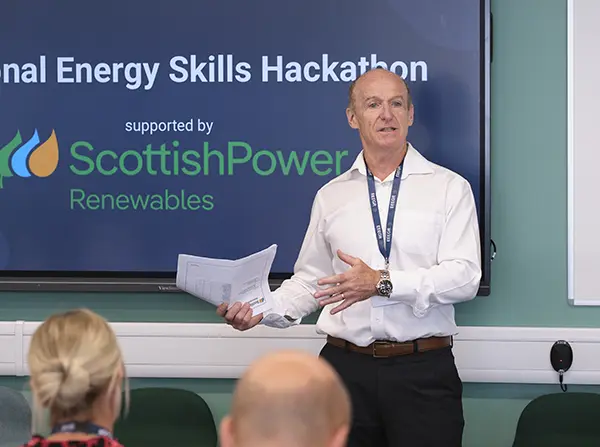
“Employers are frustrated that they can’t find the talent they need, yet the Department of Work and Pensions in Norfolk say that the number of people out of work is about the same as the number of vacancies.
“It is crystal clear that people and jobs are not connecting.
“We need a workforce fit for the next 30 years where there is a pipeline of energy projects that need skilled people and will be creating jobs locally.
“We have defined the issues, agreed practical next steps and will now be getting on with them, with a timeline to fix the skills.
The launchpad for the campaign was a Regional Skills Hackathon uniting more than 100 people on a clear mission to stop talking about solving the problem and start taking action.
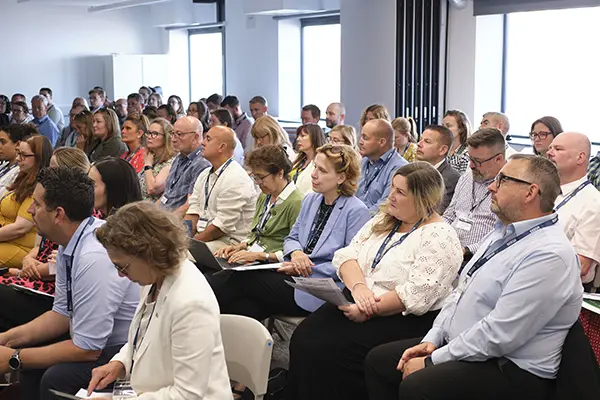
The event – at The Place, Great Yarmouth – was sponsored by ScottishPower Renewables.
The company has made Lowestoft its home for UK offshore wind where it supports hundreds of skilled jobs on its operating offshore wind farm, East Anglia ONE, and two in construction, East Anglia THREE and TWO.
At the event, Will Bridgman, Managing Director of Warren Services at Thetford, called on businesses to work harder. Part of the problem was that employers shied away from working with the unemployed because it was “too difficult.”
“Everyone can do something. It makes a real difference.”
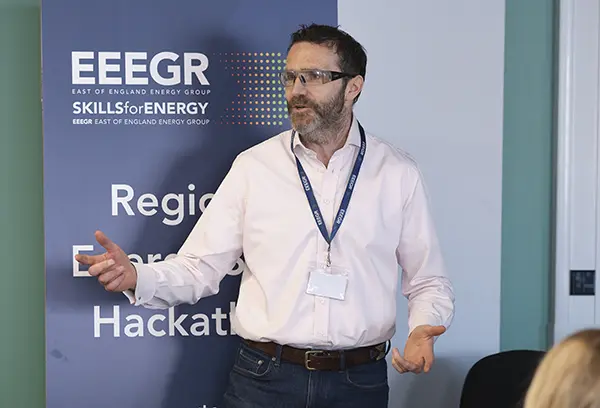
His company works with schools, including primary schools to show potential careers, donated equipment and materials to schools suffering from Design Technology funding shortages and took apprentices straight from school at 16.
He pledged to start a Year 10 – 14 and 15-year-olds – work experience programme next year, setting up a mini production line for 10 students from Thetford Academy to make a real-life product that the business needed.
“If you can’t do something with young people in your businesses, then go into schools. That experience of work is invaluable to young people.”
Lowestoft MP Jess Asato told the event: “Today’s Hackathon showed just how much talent and ambition exists here in Lowestoft, Great Yarmouth and across our coastal communities.
“We know the energy sector is growing fast, but it’s vital that local people – especially our young people – are given the skills and opportunities to be part of it. What we saw today was a powerful step forward: collaboration between industry, educators, and local authorities to build real pathways into good, secure jobs. Now it’s about turning that energy into action.”
Eilidh Campbell, senior supply chain strategy manager for ScottishPower Renewables, said: “The East of England isn’t just a fantastic resource for the offshore wind that will help power our clean energy future, its people are its biggest asset and will be at the heart of that energy transition. So, we need to ensure there is much better connectivity between all sectors of the energy industry and the people who will be the workforce – not just of today, but tomorrow and for decades to come.
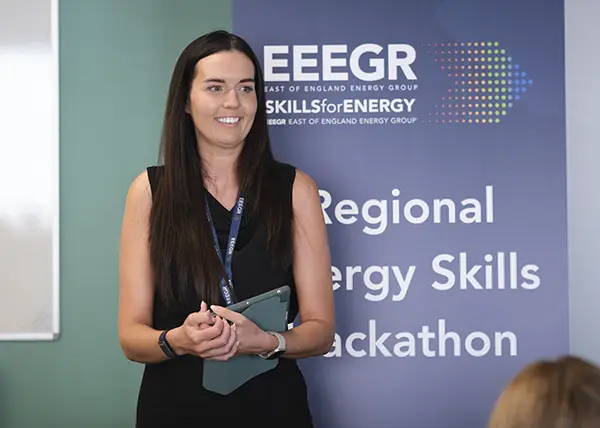
“That means coming up with practical and lasting solutions that open doors and create the pathways that will help local people build a career for life right here on their doorstep. We’re excited to be part of this mission and stand ready to do our bit as part of a meaningful and collaborative approach from right across the industry.”.”
Shaun Hutchinson, of Great Yarmouth business ODE Asset Management, said the business had dropped the average age of its workforce from 51 to 41 in the last 10 years by setting recruitment targets for new graduates and college leavers, shaping and delivering development programmes, internships and work experience.
The business had to ‘do different’ to recruit, retain and upskill to meet its growth plans and the measures were working, he said.
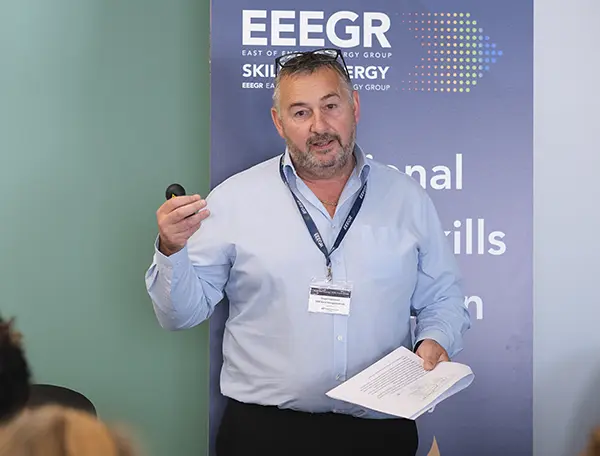
Regional director of the Engineering and Construction Industry Training Board Matt Knights told the hackathon that “the east of England is missing out” on its life-changing Work Ready programme.
The programme is changing lives by matching employers with candidates for the up-to 16-week full time training for the unemployed and Armed Forces leavers. The ECITB has agreed to work with EEEGR and make this happen in this region.
Employers came into the programme at the beginning, interviewing and selecting candidates suggested by the DWP and employing them at the end.
To run in the east of England, 13 employers needed to commit, he said.
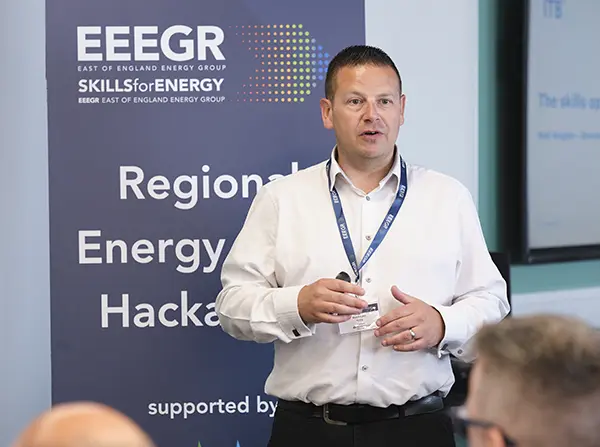
Suzanne Allen, EEEGR’s Skills for Energy Manager, questioned why schools pushed so many young people down the A level route?
“Why do people have to be disengaged to go into jobs like welding? These are highly skilled jobs but are not portrayed as such.
“We need to sell the fact that hands-on jobs are not for the disengaged, they are high value, interesting and well-paid jobs.”
North Norfolk district councillor Wendy Fredericks begged businesses to come together to give school pupils a reason to learn. “At the moment, there is no reason to learn if they can’t see where they can go. In North Norfolk, they just see catering or care. Show young children early.”
Other pledges included mapping where courses are delivered to show where to access relevant courses, pathway courses for young people coming through qualifications so young people aren’t being missed, identify and address ‘cold spots’ in school-industry relationships and pre-apprenticeship places for local high schools and work experience in a training provider’s centre.
The Inspiration Trust pledged to come up with a guide for employers of how to engage with schools.
The hackathon discussed three questions chosen by an industry survey before the event:
- How do we ensure a competent and future ready workforce?
- How do we collectively address the teacher and trainer recruitment challenge?
- How do we deliver broader, more inclusive and effective careers support across our regional education systems.
Actions and a timeline are currently being shaped.
Ideal candidate shocked employers with apprenticeship search account
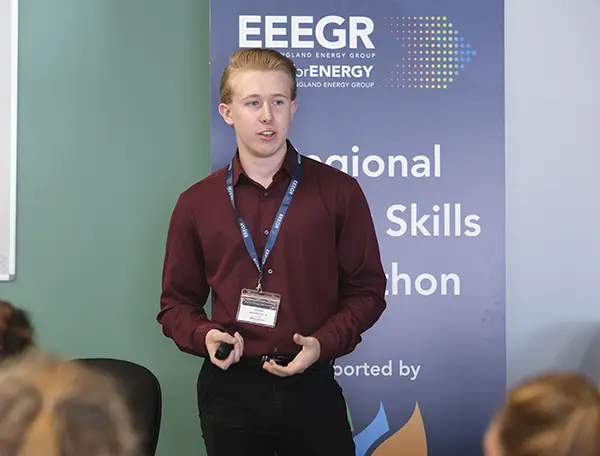
With his meticulous preparation for a career in the offshore energy industry on his doorstep, 20-year-Jake Snell presented himself as the ideal candidate for an apprenticeship.
High-grade A levels in maths and physics, a distinction in engineering and another distinction in an engineering diploma, work experience with the engineering company that delivered Lowestoft’s Gull Wing Bridge, and a part-time job in hospitality, he asked the room of employers if they would have given him an apprenticeship after college?
He received a resounding yes from the floor.
“Well, none of you did,” he told. “It culminated in nothing,” he said. “Not one of you energy companies hired me.”
In fact, only two of the 14 students on his engineering extended diploma at East Coast College found apprenticeships, and only one in the energy industry, despite multiple applications.
Jake, a former student at Sir John Leman High School, Beccles, Lowestoft Sixth Form College and East Coast College, applied “everywhere for everything.”
He sent applications to huge international businesses, large local companies and small companies, but to no avail. Some didn’t even respond to his applications.
He eventually found an apprenticeship with East Suffolk Council, as a business administration apprentice, where he has been recognised as a Rising Star.
He enjoys his role but it is far from engineering in the energy industry he set out to do and prepared himself for.
Jake opened the hackathon with his story.
“Choose us or lose us”, was his message to employers. “Jake’s story was the main inspiration for running this event and making a difference” said Kevin Keable, EEEGR Chair.
